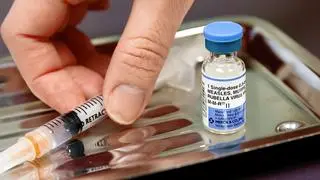In the realm of public health, India’s battle against polio stands as a beacon of hope and determination. Once a global epicentre for the disease, India has now completed a decade without a single case of wild poliovirus, marking a significant milestone in its healthcare journey.
In 2009, India grappled with over 60 per cent of all global polio cases. However, the nation turned the tide through an extensive vaccination campaign, supported by the Global Polio Eradication Initiative (GPEI) partners and the government. Thousands of volunteers traversed diverse terrains, administering polio drops to millions of children. The last case was recorded in 2011. This achievement led to the World Health Organization (WHO) certifying the Southeast Asia region as polio-free in 2014 — the fourth WHO region to receive the certification.
Global immunisation efforts for polio and other vaccine-preventable diseases like bacterial meningitis, measles, pneumococcal diseases, rubella, and yellow fever continue even today. National initiatives have helped five out of six WHO regions attain polio-free status.
This positive development strengthens hope as more children are now reaching their fifth birthday — a remarkable advancement in global child survival rates.
The robust surveillance systems, encompassing environmental surveillance sites and laboratories across 90 countries, have emerged as a functional and foundational public health machinery for multiple preventable diseases.
As the world applauds India and the Southeast Asia region for its victory over polio, the fight against this paralysing disease is not over. Afghanistan and Pakistan are the two countries where wild polio periodically surges, threatening the health of children and communities.
In 2024, 68 cases to date have been detected — 45 in Pakistan and 23 in Afghanistan.
Health workers in Pakistan and Afghanistan are taking on the task of fighting vaccine misinformation with empathy, and gradually making families understand the necessity of immunising children against polio.
The global community must focus on these regions and extend strategic support, as no child is safe anywhere unless every child receives the shield of vaccination.
Alongside their fight against polio and other infectious diseases, countries are looking to tackle emerging health issues such as mental health and cervical cancer. For instance, India is now broadening its focus to tackle cervical cancer along with existing efforts against diseases such as measles and rubella. Rotary is expanding its resources to support the Indian government in this objective.
More than 5,000 girls were vaccinated against cervical cancer in Delhi and Faridabad last year. The drive is being expanded in other states such as Maharashtra, Tamil Nadu, West Bengal, and Telangana. This initiative exemplifies India’s ability to adapt and innovate in addressing emerging health threats, demonstrating leadership in public healthcare on a global scale.
As we stand on the threshold of global polio eradication, it is vital to recognise that the struggle against preventable diseases is relentless and demands constant vigilance. The goal is for the public, private sector, and government to reignite commitment, escalate region-specific efforts, and evaluate the effectiveness of programmes to eliminate preventable diseases from our planet. Driven by optimism and unwavering determination, the journey ahead promises a healthier future for all.
(The writer is Rotary International President (2024-25). Views are personal)







Comments
Comments have to be in English, and in full sentences. They cannot be abusive or personal. Please abide by our community guidelines for posting your comments.
We have migrated to a new commenting platform. If you are already a registered user of TheHindu Businessline and logged in, you may continue to engage with our articles. If you do not have an account please register and login to post comments. Users can access their older comments by logging into their accounts on Vuukle.